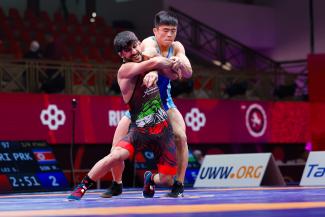UWW Academy Launches Three New Programmes
Sunday, September 26, 2021 - 03:39 By Eric Olanowski
CORSIER-SUR-VEVEY, Switzerland (September 22) – United World Wrestling’s IT and Development Departments launched three new programmes on UWW Academy, the official educational learning platform for coaches, referees and athletes.
The United World Wrestling Academy is an integrated online learning portal designed to provide information, tools and resources in order to support and enhance the knowledge and value of the discipline of wrestling.
Periodization in Planning, Coaching Philosophy and Programme Development are the three programmes that launched in English on Wednesday morning.
“The IT and Development Departments of UWW are very excited to launch these additional programmes on the UWW Academy” said UWW’s Development Director, Deqa Niamkey. “The wrestling community worldwide has shown great interest for the platform, and therefore, we must continue to pursue these developments to further expand wrestling knowledge worldwide.”
‘Periodization in Planning’ looks at the basics of implementing periodization into training. It covers the benefits of periodization, different methods for periodization, and covers key points and questions regarding the implementation of this planning.
‘Coaching Philosophy’ will help coaches develop their coaching philosophy. It is an interactive course where coaches will learn and answer questions regarding their philosophy. The coaches will learn about three areas: self-awareness, their purpose, and the different types of leaders. Then, they will use their answers to draft their coaching philosophy statement.
‘The Programme Development' course focuses on the key concepts on how a coach would develop their program or team. The course begins by helping them develop a plan and set goals. It then extensively covers how to develop and implement a training plan. The course also helps coaches develop a vision statement, budget and financial strategies, use social media for promotion, and create a risk management plan.
Outside of the newly-released Periodization in Planning, Coaching Philosophy and Programme Development programmes, other helpful UWW Academy resources and courses included:
Courses:
- Ready to Wrestle
- UWW Online Rules Test
- Introduction to Coaching and Safety
- Introduction to Practice Planning
- Introduction to Refereeing
Resources:
- Wrestle4Fun
- United World Wrestling Coaching Pathway
- United World Wrestling Referee Pathway
- Anti-doping and WADA Programs
- IOC Programs
- E-Journals and Performance Analysis for UWW Competitions
For more details on the educational courses and resources that the UWW Academy has to offer, please visit www.uwwacademy.org.


Share your thoughts.
Comments